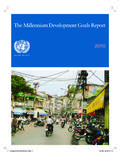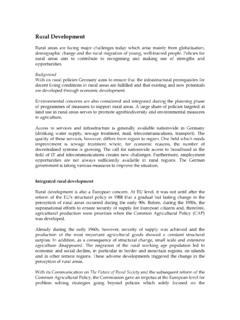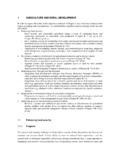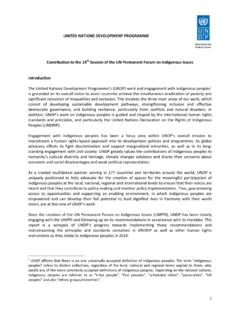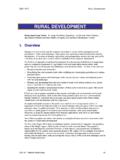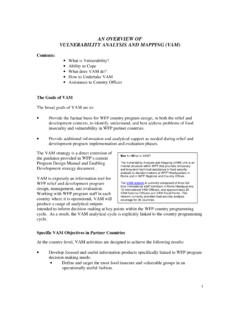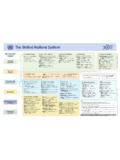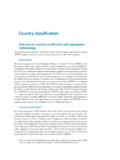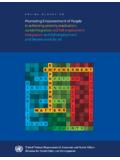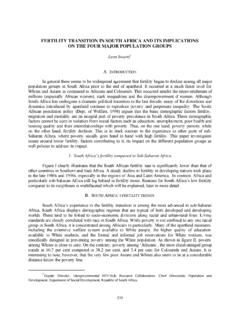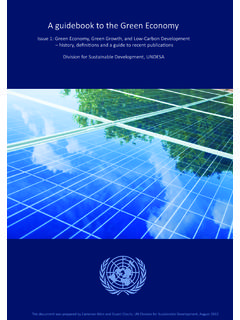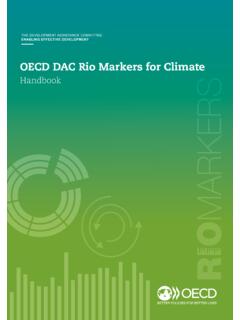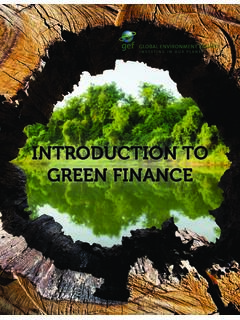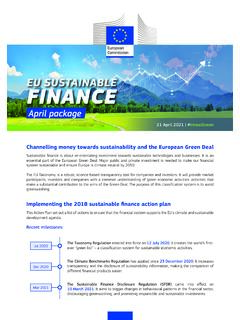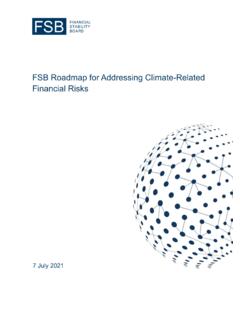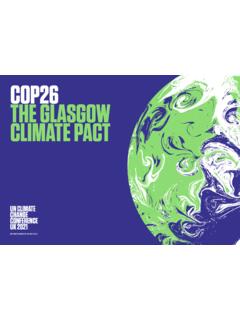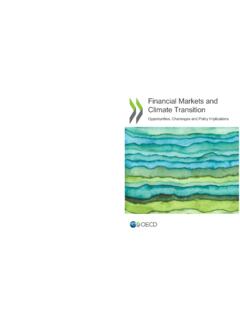Transcription of DELIVERING ON THE $100 BILLION CLIMATE FINANCE …
1 1 DELIVERING ON THE $100 BILLIONCLIMATE FINANCE COMMITMENTAND TRANSFORMING CLIMATE FINANCEINDEPENDENT EXPERT GROUP ON CLIMATE FINANCEDECEMBER 20202 PUBLISHED DECEMBER 2020 THE INDEPENDENT EXPERT GROUP ON CLIMATE FINANCEAMAR BHATTACHARYA, RICHARD CALLAND (CO-CHAIRS); ALINA AVERCHENKOVA, LORENA GONZALEZ, LEONARDO MARTINEZ-DIAZ AND JEROME VAN ROOIJ.**The views expressed are those of the expert group in their individual capacities, not of the institutions or organiza-tions they represent and nor of the United Nations. Leonardo Martinez Diaz contributed to the report until 9 November 2020, after which he recused himself from further engagement given new official BY PHOTO BY CHRIS YANG (UNSPLASH)COPYRIGHT 2020. ALL RIGHTS EXPERT GROUP ON CLIMATE FINANCEABOUT THE AUTHORS*Dr. Alina Averchenkova is a Distinguished Policy Fellow and Lead for Governance and Legislation at the Grantham Research Institute on CLIMATE Change and the Environment at the London School of Economics and Political Bhattacharya is Senior Fellow at the Center for Sustainable development , Global Economy and development , Brookings Institution.
2 He co-leads the LSE-Brookings Sustainable Growth and FINANCE Initi-ative together with Professor Nicholas Stern. Richard Calland is associate professor in public law at the University of Cape Town, a Fellow of the Univer-sity of Cambridge Institute for Sustainability Leadership and a founder co-director of the African CLIMATE FINANCE Gonz lez is Senior Associate for United Nations CLIMATE FINANCE at the World Resources Institute. In this position, Lorena is designing and directing policy-oriented research to promote a stronger CLIMATE FINANCE regime. Leonardo Martinez-Diaz is Global Director of the Sustainable FINANCE Center at the World Resources In-stitute in Washington, He is currently on leave from WRI on a special van Rooij is a founding co-director of the African CLIMATE FINANCE Hub, and CLIMATE FINANCE expert for the Africa CLIMATE Change Fund hosted by AfDB.*The views expressed are those of the expert group in their individual capacities, not of the institutions or organiza-tions they represent and nor of the United Nations.
3 Leonardo Martinez Diaz contributed to the report until 9 November 2020, after which he recused himself from further engagement given new official authors wish to record their sincere appreciation to the many people who gave time and attention to various drafts of this report and who provided useful comments and suggestions. We benefited greatly from the feedback received at the Roundtable Discussion on the Analysis by an Independent Group of Experts of Progress Toward the USD 100 BILLION Goal Under the UNFCCC organised by the Office of the Secretary-general of the UN on 18 November 2020. We are also grateful for the interactions and feedback from the UNFCCC Secretariat and the OECD on the technical aspects of the paper, and for the numerous consultations and feedback from colleagues at the multilateral concessional funds, the multilateral de-velopment banks and IDFC as well as other professional colleagues. Finally, we are deeply grateful to the CLIMATE action team in the UNSG s office for their advice and outstanding OF CONTENTSLIST OF CHANGING CONTEXT: THE IMPACT OF THE COVID-19 PANDEMIC ON THE CLIMATE FINANCE LANDSCAPE AND THE TRANSFORMATIVE IMPERATIVE FOR CLIMATE FINANCE13 SUMMARY OF KEY FINDINGS & TO THE CLIMATE CRISIS IN THE AFTERMATH OF THE COVID-19 IS THE ROLE OF CLIMATE FINANCE ?
4 CHANGING CONTEXT: THE IMPACT OF COVID-19 ON THE CLIMATE FINANCE URGENT IMPERATIVE FOR TRANSFORMATIVE CLIMATE TOWARDS THE $100BN TARGET WHAT IS THE CURRENT STATE OF CLIMATE FINANCE ? 21 SUMMARY OF KEY FINDINGS & THE NATURE OF THE $100 BILLION CLIMATE FINANCE AND ASSESSING PROGRESS ON DELIVERY OF $100 OF ASSESSMENTS OF PROGRESS TOWARDS MEETING THE $100 BILLION ARE WE ON THE PATH TO $100 BILLION ? THE BILLIONS INTO TRILLIONS: HOW CAN WE GET MORE MONEY TO FLOOD INTO THE SYSTEM? 37 SUMMARY OF KEY FINDINGS & NEED TO STRENGTHENING DOMESTIC POLICY FORWARD-LOOKING CLIMATE FINANCE CONESSIONAL CONCESSIONAL THE POTENTIAL OF THE MULTILATERAL development BANKS AND THE DFI BROADER development FINANCE development FINANCE CREDIT FINANCIAL SYSTEM AT LARGE AND ENHANCING THE ROLE OF THE PRIVATE SECTOR IN CLIMATE FINANCE52 SUMMARY OF KEY FINDINGS & IMPERATIVE TO HARNESS PRIVATE FOR THINKING ABOUT ARTICLE SECTOR AND THE ROAD 163 ENDNOTES645 AFAdaptation FundAfDFAfrican development FundAsDFAsian development FundAUMA ssets Under ManagementBAsBiennial Assessments and Overviews of CLIMATE FINANCE FlowsBRsBiennial ReportsCBDC onvention on Biological DiversityCIFsClimate Investment FundsCOPC onference of the PartiesCPIC limate Policy InitiativeCRSC reditor Reporting System (of the OECD)
5 CSOsCivil Society OrganizationsCTFsCommon Tabular FormatsDACD evelopment Assistance CommitteeDFIsDevelopment FINANCE InstitutionsDSSIDebt Service Suspension InitiativeECAsExport Credit AgenciesECLACE conomic Commission for Latin America and the CaribbeanEDFIE uropean development FINANCE InstitutionsEMDEsEmerging Market and Developing EconomiesESGE nvironmental, Social and GovernanceETFsExchange Trade FundsEUEuropean UnionFIForeign direct investmentG20 Group of 20 GCFG reen CLIMATE FundGDPG ross Domestic ProductGEFG lobal Environment FacilityGHGsGreenhouse Gas EmissionsGIFG lobal Infrastructure FacilityGNIG ross National IncomeILOI nternational Labour OrganisationIMFI nternational Monetary FundIDAI nternational development AssociationIDFCI nternational development FINANCE ClubIRENAI nternational Renewable Energy AgencyLDCsLeast Developed CountriesLLDCsLandlocked Developing CountriesLT-LEDSLong-Term Low GHG Emission development StrategiesMDBsMultilateral development BanksNDCsNationally Determined ContributionsODAO fficial development AssistanceOECDO rganisation for Economic Co-operation and DevelopmentOOFO ther Official FlowsPACTAP aris Agreement Capital Transition AssessmentPSFGCF s Private Sector FacilitySCFS tanding Committee on FinanceSDGsSustainable development GoalsSDRS pecial
6 Drawing RightsSIDSS mall Islands Developing StatesSOEsState-Owned EnterprisesTCFDT askforce on CLIMATE -Related Financial DisclosuresUNCTADU nited Nations Conference on Trade and DevelopmentUNCCDUN Convention to Combat DesertificationUNFCCCUN Framework Convention on CLIMATE ChangeWTOW orld Trade OrganizationLIST OF ACRONYMS6 SYNOPSISOur starting point is the COP16 Accord, which states that: developed country Parties commit, in the con-text of meaningful mitigation actions and transparency on implementation, to a goal of mobilizing jointly USD 100 BILLION per year by 2020 to address the needs of developing countries . This commitment has been central to the CLIMATE accords since 2009 and is an important symbol of trust. Developing countries rightly consider it essential for securing progress and meeting the goals of the Paris Agreement. It is the bedrock of international CLIMATE FINANCE , underpinning international agreement and co-operation on CLIMATE highlighting the deepening CLIMATE emergency at the UN CLIMATE Action Summit in September 2019, the UN Secretary General underscored the pivotal importance of scaling up and accelerating the delivery of international public COVID-19 pandemic has drastically altered the context for international CLIMATE FINANCE .
7 It has result-ed in the most damaging humanitarian and economic crisis since the Second World War and its impacts have been particularly severe on emerging markets and developing economies (EMDEs). They have suf-fered large losses of revenue with knock-on effects on their fiscal and debt positions. 54% of low-income countries are deemed to be in debt distress or at high risk of debt distress as of September 2020, a trend likely to continue into 2021. The pandemic has also exacerbated the debt pressures on many CLIMATE -vulnerable middle-income world needs to simultaneously tackle the COVID-19 and CLIMATE crises. The pandemic has highlighted that the old normal was deeply fragile and dangerous. Should the world fail to act now, the harm caused by CLIMATE change and biodiversity loss will be much greater and longer-lasting than the damage inflicted by COVID-19. The immediate imperative in recovery is to build back better , placing the world on a path of sustainable, inclusive, and resilient growth.
8 The crisis presents an enormous threat but also a one-off, last-chance opportunity to restructure econ-omies at the pace and scale that CLIMATE science requires by integrating CLIMATE action into the economic recovery from COVID-19. For EMDEs, the challenge of putting in place ambitious and sustainable recovery packages is daunting. In contrast to the rich countries, they are much more constrained in their ability to respond due to lack of fiscal space and reduced access to external FINANCE . No African country has been able to access the sov-ereign debt market since February and there have been more downgrades in credit ratings in 2020 than in any other previous year in history. If EMDEs are unable to put in place recovery packages that are strong and sustainable, it will not only be deeply damaging for their own growth prospects but will put the CLIMATE goals irrevocably beyond reach. EMDEs already account for two-thirds of global emissions and many are also the most vulnerable in the face of CLIMATE change.
9 A strong program of support to tackle their debt and financing needs is a win-win proposition for the global economy and for the public CLIMATE FINANCE will have a crucial role to play in supporting a better recovery and transformation to low-carbon and CLIMATE -resilient growth. As the bedrock of international public FINANCE , the $100 BILLION commitment can work in concert with all pools of FINANCE , including the large and un-tapped pools of private THE $100 BILLION TARGET BE MET?The basis for counting remains the subject of some contention. The language of the CLIMATE accords start-ing with COP16 makes it clear that the $100 BILLION may include FINANCE from public and private sources. The accords do not specify the proportions of financing from these different sources, nor indicate how different financial instruments, such as grants and loans, should be counted.
10 The guidance from the CLIMATE accords has been reflected in the official reporting on CLIMATE FINANCE under the UNFCCC and in the Biennial Assessments and Overviews of CLIMATE FINANCE Flows (BA) issued by the Standing Committee on FINANCE . It has also been reflected in the regular assessments of progress towards the $100 BILLION target produced by the OECD. Two other assessments have been made on the delivery of the $100 BILLION commitment from Oxfam and the Government of India using different methodological approaches that have excluded non-grant equivalent public FINANCE and/or FINANCE mobilized from private sources. Modalities established for UNFCCC Parties to report CLIMATE FINANCE under the Convention, and for OECD DAC members to report CLIMATE -related development FINANCE into the DAC statistical system, provide a reasonable basis for reporting on international CLIMATE FINANCE and the delivery of the $100 BILLION .
